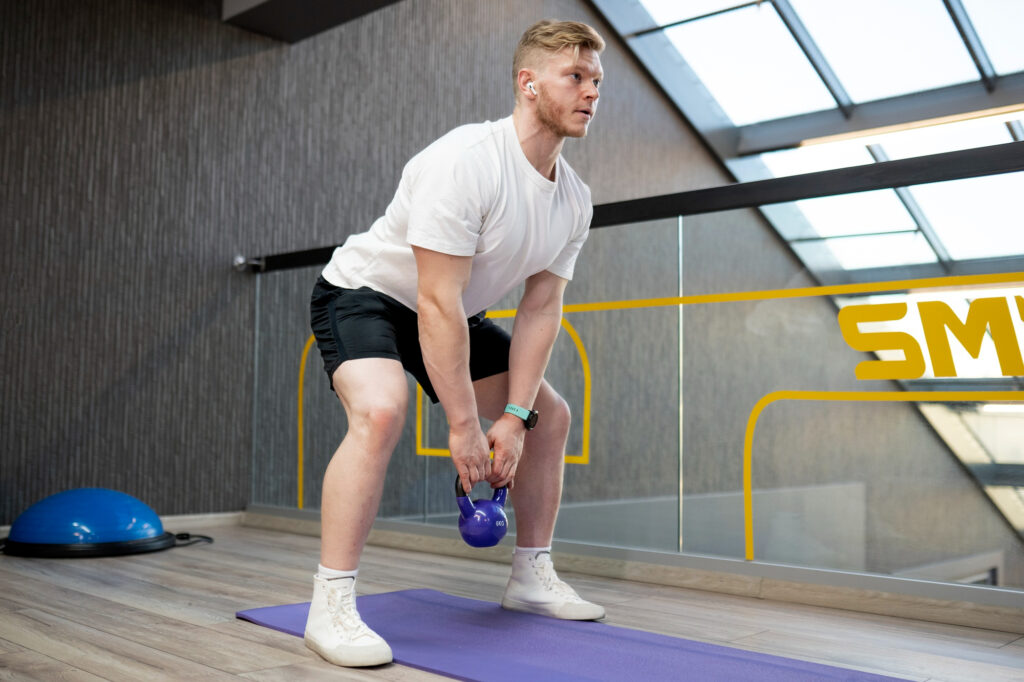
Functional fitness refers to exercise that trains the body for daily activities and improves overall
physical abilities needed for real-life movements. Unlike traditional fitness which often focuses on
isolating muscles or improving specific aspects like strength or endurance, functional fitness aims to
enhance the efficiency and ease of performing movements required in everyday life. Its importance
lies in its practicality, injury prevention, and overall health benefits. Here’s why functional fitness is
essential:
1. Improved Everyday Movement:
Functional fitness emphasizes movements that mimic daily activities, such as bending, lifting, pushing, pulling, and rotating. This type of training helps you perform everyday tasks—like picking up groceries, lifting children, or climbing stairs—more efficiently and with less effort, making life smoother and less taxing on your body.
2. Injury Prevention:
Functional fitness strengthens muscles and joints in a balanced way by focusing on
movements involving multiple muscles and joints working together. This can help correct muscle imbalances, improve posture, and enhance joint stability, reducing the risk of injuries both in everyday tasks and during exercise.
It also improves balance, coordination, and flexibility, helping to prevent falls or accidents,
particularly as we age.
3. Increased Strength and Mobility:
• Rather than isolating a single muscle, functional fitness focuses on improving overall
strength, endurance, and mobility by engaging multiple muscle groups simultaneously. For
example, exercises like squats, lunges, and push-ups work multiple muscles and joints in
ways that improve movement efficiency.
• This can lead to a better range of motion and more freedom in movement, which is important for maintaining independence as you age.

4. Enhanced Core Stability:
Functional exercises typically engage the core muscles (abdominals, back, pelvis), which are
essential for maintaining stability and balance during movement. A strong, stable core
reduces the risk of back pain, improves posture, and enhances overall body mechanics.
By strengthening the core, you improve your ability to transfer force through the body,
making other movements (like lifting or twisting) safer and more effective.
5. Better Posture and Alignment:
Poor posture can lead to chronic pain, discomfort, and an increased risk of injury. Functional
fitness exercises often focus on improving postural alignment, as they require the body to
move in natural patterns. This helps develop the muscles that support good posture,
particularly in the back and core.
6. Efficiency in Fitness:
Functional fitness can lead to greater overall fitness in less time because the exercises often
engage multiple muscle groups at once. This can provide a full-body workout that improves
strength, flexibility, balance, and endurance in a single session, making it an efficient way to
train.
7. Adaptability for All Ages and Fitness Levels:
• Functional fitness can be adapted to suit people of all ages, fitness levels, and goals.
Whether you’re a senior looking to improve balance, an athlete aiming to enhance
performance, or someone looking to stay active in everyday life, functional fitness can be
tailored to meet your needs.
• It’s especially beneficial for older adults as it focuses on maintaining strength, balance, and
mobility, which are key factors in preserving independence and reducing the risk of falls.
8. Improved Sports Performance:
• For athletes, functional fitness enhances movement patterns specific to their sport,
improving performance in activities like running, jumping, and quick directional changes. This
type of training mimics the actual movements athletes make during their sport, leading to
more efficient and effective physical performance.

9. Holistic Approach to Fitness:
• Functional fitness not only improves physical health but also has a positive impact on mental
well-being by promoting mindfulness, body awareness, and stress relief through movement.
The focus on full-body engagement and coordination can be more stimulating and enjoyable
compared to traditional, repetitive weight-lifting or machine-based exercises.
10. Long-Term Health and Longevity:
• By improving your body’s functionality, functional fitness can help maintain independence
and quality of life as you age. It focuses on promoting strength, mobility, and balance, which
are crucial for remaining active and healthy over the long term.
In summary, functional fitness is important because it enhances your ability to perform daily tasks
efficiently, reduces the risk of injury, improves strength and mobility, and supports overall physical
and mental well-being. It is a practical and effective way to build strength, endurance, flexibility, and stability for life.